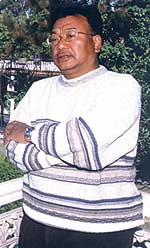 Despite the immense potential and opportunities that we are blessed with, Nepalis have developed a strange complex. They don't believe in themselves anymore, they lack self esteem and underestimate their own capabilities. This inferiority is becoming a national epidemic.
Despite the immense potential and opportunities that we are blessed with, Nepalis have developed a strange complex. They don't believe in themselves anymore, they lack self esteem and underestimate their own capabilities. This inferiority is becoming a national epidemic. The intelligentsia that is supposed to lead society is gripped by negativism. People from all walks of life see nothing but despair and hopelessness in their sectors. The honest, creative people are demoralised. We must stop devaluing ourselves all the time.
Intellectuals and politicians must accept partial blame for spreading rumours that Nepal is in shambles. They misused the nation as a begging bowl among international donors for their own personal aggrandisement. Witnessing all those vested interests at work, the new generation has every reason to feel depressed, especially when their peers desert the country in droves for a better future.
Has Nepal crossed the point of no return? Is the rot irreversible? Yes, we are in a bit of a jam, but it is a crisis we can pull ourselves out of. These are problems resulting from decades of mismanagement. The country that used be one of the safest in the world a decade ago, now has a badly tarnished international image, thanks also to the Maoist insurgency.
But, let's face it, Nepal is not the only nation that has problems. We are going through a nation-building phase that has forced us to come to terms with some of the contradictions in our socio-political milieu. We have to tackle this head-on. With problems come opportunities. They demand solutions, which in turn invite progress that leads to development. Sadly, a majority of Nepalis are so put off by the state of affairs that they choose to give up.
If we analyse our past, we will be able to see some progress. Fifteen years ago, we had to go to India for simple medical-surgeries. Today, Nepal has the facilities even for open-heart procedures. A decade ago, we had to curry favour from junior staff at embassies to send our children abroad to study. Today, our children have many choices right here in Nepal. Notice the leap we made in the areas of communication and banking. Those who harp on about our non-performance must acknowledge the success stories like the apple orchards in Mustang. Nepal is not landlocked, it is brain-locked.
While Nepal occupies only 0.15 percent of the earth's land surface, we boast about 15 percent of its biodiversity. We are the second richest country in terms of water resources, with the second largest population of tigers, the biggest number of snow leopards in the world and, believe it or not, the biggest stock of wild honey. Yet we feel ashamed of ourselves. What an irony! Get on a bicycle and visit our seven world heritage sites inside Kathmandu Valley, all within an hour of each other. Is there any other place so rich in culture and heritage? Our ancestors built the Nyatapola without scaffolding, they crafted underground water channels to feed urban water spouts.
Democracy is a Pandora's box. The bad will get evil things from it, but for the majority, it will bring hope. We need to revive optimism among those who despair about the country's future. We need visionaries who can teach the Nepali people to dream again. We have to lift each other out of this morass. Each of us, in our little niches, have to maintain our integrity and our sense of national purpose.


